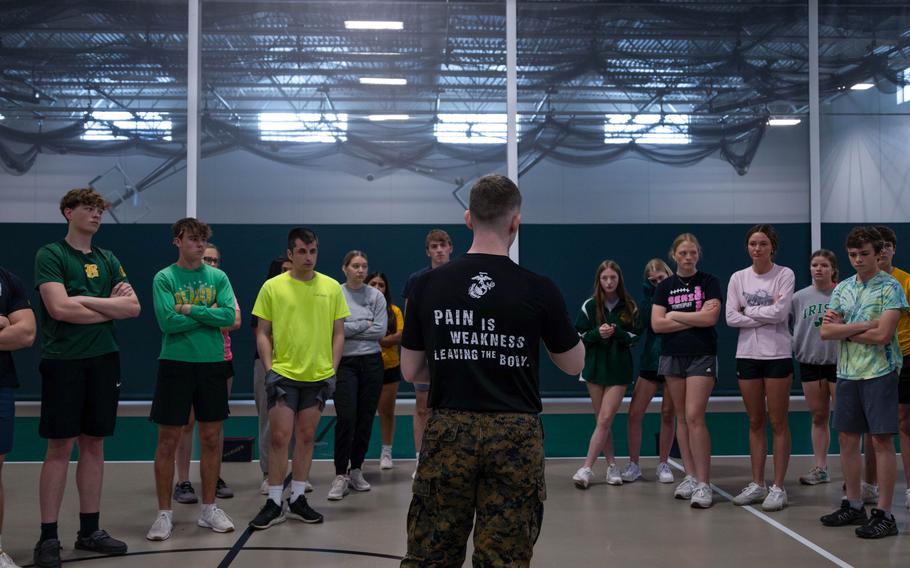
Marine Corps Sgt. Daniel Breuer, a recruiter for the service, leads high schoolers in strength and conditioning at Beckman-Dyersville Catholic High School in Dyersville, Iowa, on April 25, 2024. During the class, students participated in Marine Corps-style competitive workouts, learned about the importance of leadership, and were given the chance to ask questions about Marine Corps benefits and opportunities. (Collette Hagen/U.S. Marine Corps)
WASHINGTON — Navy leaders on Thursday said they are pushing for more access to high schools as the service faces another recruiting shortfall this year and recruiters across the military complain of limited admission to campuses.
Navy Secretary Carlos Del Toro said the service wants to see recruiter access to high schoolers increase from a minimum of two times per year to four. The Pentagon is pitching lawmakers on a similar proposal, describing current access standards for all services as “suboptimal.”
“We’re getting the required level of access, not necessarily the desired level of access,” Ashish Vazirani, the acting undersecretary of defense for personnel and readiness, said at a congressional hearing last week.
Del Toro told the Senate Armed Services Committee on Thursday that the Navy’s recruiters have cited a lack of adequate access to high schools as one of their top challenges. He said he has written thousands of letters to high school principals urging them to open their doors.
“We’re working very closely with the Department of Education and with supervisors from across the nation to try to break down those barriers so that our recruiters can actually get access to the high schools,” he said.
The Navy is expected to fall short of its 2024 recruiting goal by 6,200 sailors.
It has taken several controversial steps to boost its ranks, including enlisting people who did not graduate from high school as long as they scored at least a 50 out of 99 on the Armed Services Qualification Test. In 2022, the Navy started accepting more sailors who scored very low on the test and raised the maximum enlistment age from 39 to 41.
Adm. Lisa Franchetti, chief of naval operations, assured senators that the Navy was not lowering its standards. She said retention remained strong and recruitment was picking up, despite struggles to meet growing manning requirements at sea.
“We are 2,500 recruits ahead of where we were last year at this time, and I remain optimistic our marketing and data analytics investments will show additional progress throughout the year,” she said.
Access to high schools remains a top focus, however. Graduating high school students are a critical source of new recruits for the military and federal statutes mandate that recruiters be given the same access to public high schools as colleges and employers.
But about 5% of schools nationwide are failing to provide that access, according to an April report by the Rand Corp. Up to 14% of schools in some states are failing to comply with the law by not providing contact information for students and not offering adequate access to recruiters or both.
Recruiters said they found some schools hostile to their outreach and had to restrict their movement to a designated table in a lunchroom where they were not allowed to approach students, according to the report. School representatives cited past negative experience with recruiters and “anti-military” sentiments in the community as some of the reasons for their resistance.
Lawmakers, particularly veterans, have expressed interest in solving the problem legislatively.
Sen. Joni Ernst, R-Iowa, said she will continue to work on an effort that she started last year to force high schools to let in recruiters. Sen. Dan Sullivan, R-Alaska, said last week that the issue should be addressed in the 2025 National Defense Authorization Act, an annual bill setting Pentagon priorities.
“It’s a disservice to students not to give them access and understanding” about the military, Sullivan said. “It’s a disservice to our nation.”
